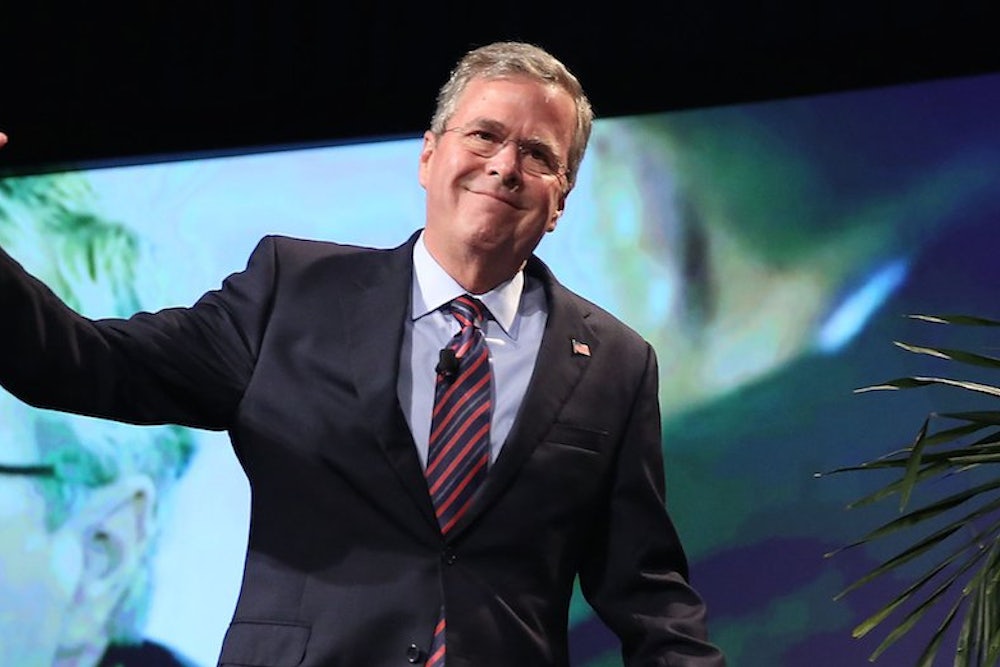Former Florida Governor Jeb Bush has been unofficially campaigning for president for months, even years, but once he makes it official Monday he might break a few conservative hearts that pine for a GOP candidate who isn’t a climate change denier.
Long before he even launched his campaign, Bush managed to raise hopes that he will be one of the few reasonable Republican presidential aspirants on climate change. Those hopes haven’t panned out. So far, Bush has only sent mixed (and for environmentalists, mostly discouraging) signals that he intends to align more closely with the climate-change denying camp than with believers. “It’s not entirely clear he has both feet directly in either camp at the time,” said Andrew Moylan, executive director of R Street, a think tank with conservative solutions for climate change.
Last month in New Hampshire, Bush said, “The climate is changing.” But he went on to say, “For people to say the science is decided on this is just really arrogant, to be honest with you. It’s this intellectual arrogance that now you can't have a conversation about it, even.” In an earlier event in New Hampshire, Bush also rejected that the government can both address warming and grow the economy, saying he worried “about the hollowing out of our country, the hollowing out of our industrial core, the hollowing out of our ability to compete in an increasingly competitive world.” He’s been repeating a version of this at least since 2011, when he argued, “It is not unanimous among scientists that it is disproportionately manmade. What I get a little tired of on the left is this idea that somehow science has decided all this, so you can’t have a view.”
While a small number of Republicans truly believe that only God controls the climate, plenty of others only equivocate on the science in public for political expedience. Bush’s wide-ranging responses on climate suggest he falls in the latter camp.
Perhaps that’s why some Republicans, the ones who accept manmade climate change is real, still have not abandoned hope he will embrace the issue.
“In some ways Bush gets a somewhat bad rap from folks who claim he is throwing his lot in with deniers and skeptics,” Moylan said of Bush’s support for natural gas as a way of reducing greenhouse gas emissions, and his acceptance that the climate is changing (even though he won’t say humans are responsible). Though Bush hasn’t endorsed specific climate policy solutions, Moylan thinks he still “has a reasonably good grasp” of the issue.
Ex-Congressman Bob Inglis, a Republican who now advocates for conservative climate solutions, said in an interview that it’s possible a few candidates will come to publicly accept climate science. “We might see a breakout by Rand Paul where [he] says sure we can solve this thing; all it is, is a problem of economics,” Inglis said. “Jeb Bush is another possibility that may come clear on this.”
GOP donor Andrew Sabin, a friend of the Bush family, told Politico last week, “If Jeb Bush comes out with a good environmental policy, he’s going to attract young Republicans for sure, and across the aisle to Democrats and independents it’s going to be a huge help,” Sabin said. “If he’s our candidate, there is no Democrat in this country who would touch him if he had a good environmental plan.”
Then there is Jay Faison, a new arrival to conservative climate advocacy who has pledged $175 million of his own money to the ClearPath Foundation for a campaign to persuade Republicans to combat climate change and endorse green energy. Faison, a North Carolina businessman, has donated $50,000 to Bush's Right to Rise PAC.
Bush has at least one person that makes coming forward on climate change easier, and that’s long-shot presidential candidate Lindsey Graham (Faison has also donated to Graham's campaign). Graham has dared fellow Republicans to come forward with an environmental platform, saying, “If I’m president of the United States, we’re going to address climate change, CO2 emissions in a business-friendly way.” With Graham around, Bush would not be the only candidate discussing climate change in a serious way.
